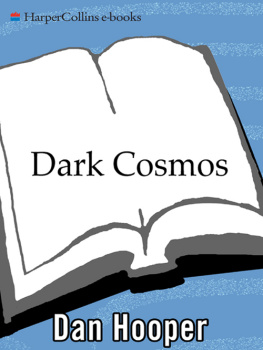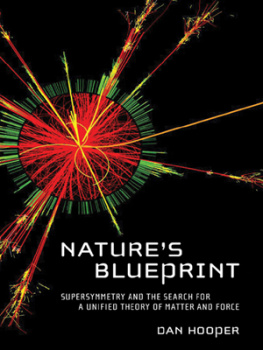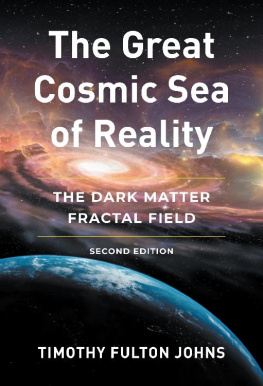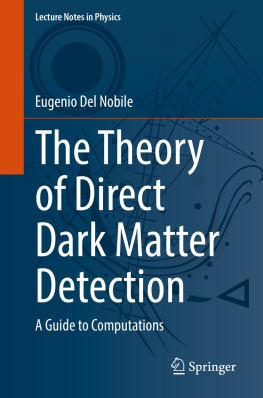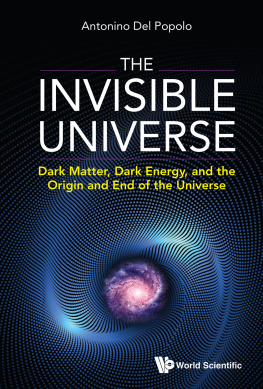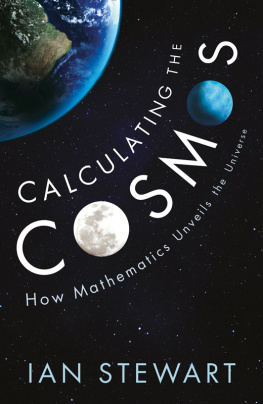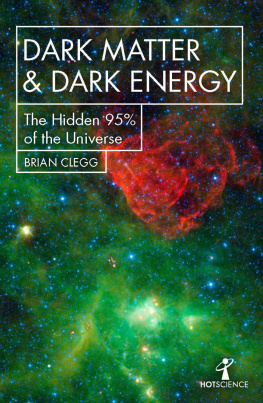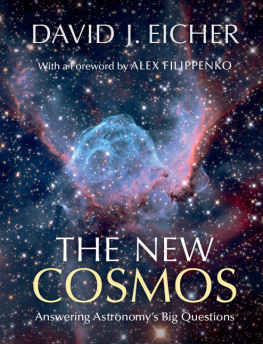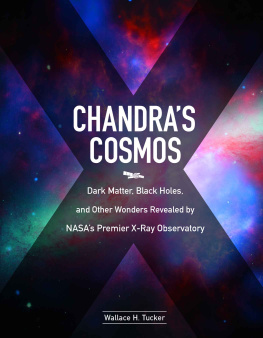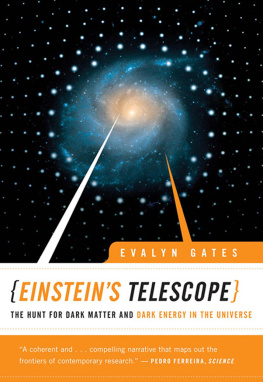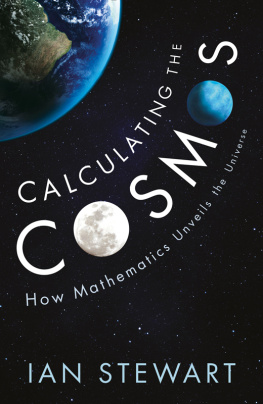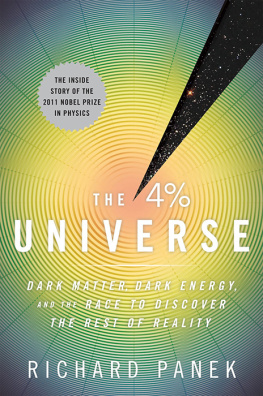Hooper - Dark cosmos: in search of our universes missing mass and energy
Here you can read online Hooper - Dark cosmos: in search of our universes missing mass and energy full text of the book (entire story) in english for free. Download pdf and epub, get meaning, cover and reviews about this ebook. City: New York, year: 2006, publisher: HarperCollins;Smithsonian Books;Collins, genre: Children. Description of the work, (preface) as well as reviews are available. Best literature library LitArk.com created for fans of good reading and offers a wide selection of genres:
Romance novel
Science fiction
Adventure
Detective
Science
History
Home and family
Prose
Art
Politics
Computer
Non-fiction
Religion
Business
Children
Humor
Choose a favorite category and find really read worthwhile books. Enjoy immersion in the world of imagination, feel the emotions of the characters or learn something new for yourself, make an fascinating discovery.
Dark cosmos: in search of our universes missing mass and energy: summary, description and annotation
We offer to read an annotation, description, summary or preface (depends on what the author of the book "Dark cosmos: in search of our universes missing mass and energy" wrote himself). If you haven't found the necessary information about the book — write in the comments, we will try to find it.
Dark cosmos: in search of our universes missing mass and energy — read online for free the complete book (whole text) full work
Below is the text of the book, divided by pages. System saving the place of the last page read, allows you to conveniently read the book "Dark cosmos: in search of our universes missing mass and energy" online for free, without having to search again every time where you left off. Put a bookmark, and you can go to the page where you finished reading at any time.
Font size:
Interval:
Bookmark:
Our Dark Universe
Dead Stars, Black Holes, Planets, and Baseballs
Darkness from the Quantum World
A Dark Animal in the Quantum Zoo
A Grand Symmetry
The Hunt
Gravity, Strings, and Other Dimensions of Space
In the Beginning
The Weight of Emptiness
An Unlikely Universe?
Cosmic Offspring
The Skeptics
Visions of the Future
I t is a common misconception that scientists want everything to be neat and tidythey dont want anyone questioning their ideas, or suggesting that current explanations are incomplete. This perception is, of course, completely off the mark. After all, if we scientists knew everything, there would be nothing left to discover! It is not completely facetious, however, to suggest that what every scientist dreams of doing each day is to prove his or her colleagues wrong.
What scientists find most exciting are mysteriespuzzles with the final pieces not yet in place. And this is why modern cosmology has captured the attention of so many physicists, theorists, and experimentalists from many different subfields. Few mysteries in nature are as deep, or as puzzling, as those associated with observational discoveries in cosmology over the past thirty years or so.
Almost twenty years ago, I wrote that we are in the midst of perhaps the greatest Copernican-like revolution in history. Copernicus, you will recall, boldly and correctly argued that Earth was not the center of the solar system. In the 350 years or so since his insights were confirmed, humans have, if anything, continued to be relegated farther and farther from the center of the Universe. Not only is Earth not the center of the solar system, our solar system is not the center of our galaxy, instead residing in a boring suburb on its outskirts. And our galaxy is not the center of our cluster of galaxies, and so on. Indeed, there is absolutely nothing special about our location in a Universe that we find is more or less the same in all directions.
Things are even worse. Not only are we not at the center of the Universe, but we have now discovered that if you got rid of us, our planet, our Sun, all the stars and galaxies and gas that we can see through our telescopes, the Universe would still be largely the same! We are, if anything, a small bit of pollution in a Universe dominated not by matter such as that which makes us up, but rather matter and energy that appear to be completely different from anything we have ever observed on Earth. If we did not feel cosmically insignificant before, we should now.
We have learned that the dominant material in our galaxy, and pretty well all galaxies we can see, is invisible to telescopes. It doesnt shine. The good news is that if this odd sort of material is made from some new type of elementary particle, then the dark matter that dominates our galaxy is not just out there, it is in the room as you read this, traveling through the paper, and through your body. In this case, if we are clever, we can design experiments here on Earth to detect this stuff!
What makes the discovery of dark matter even more exciting is that our study of the fundamental structure of matter, called elementary particle physics, is at a crossroads. The current standard model of particle physics, which thus far has explained everything we can see, is nevertheless incomplete. Hidden behind the mathematical predications that agree so well with observations are deep dilemmas. We hope to resolve some of these dilemmas through the next large particle accelerator, called the Large Hadron Collider, due to come online in 2008.
Of course, theorists have not been idle while we wait for this machine to turn on. We have been developing sophisticated guesses as to what nature may reveal as we open this new window on the Universe. And guess what? Almost all these guesses involve new particles and fieldsthus far undetectedthat could be the mysterious dark matter we seem immersed in today.
In this sense, then, the mystery of dark matter ties together the major outstanding puzzles in two complementary and seemingly disparate fields, particle physics and cosmologythe physics of the very small and the very large, respectively. Resolving this mystery might therefore produce not just one, but two quantum leaps in our understanding of nature.
This alone would be reason enough to celebrate the emerging field of particle astrophysics. But almost a decade ago, an even more puzzling discovery made the idea of dark matter, as exotic as it is, seem tame.
We have discovered that by far the biggest form of energy in the Universe does not involve matter at all! Most of the energy in the Universe seems instead to reside in empty space. This energy is gravitationally repulsive and appears to be causing the speeding of the observed expansion of the Universe.
To suggest that we dont understand much about dark energy is an understatement. Why empty space should have the energy it apparently does is probably the biggest mystery in all of physics. The recognition that this energy appears to exist has completely altered the landscape of theoretical particle physics, while at the same time driving a host of astronomers and astrophysicists to launch new cosmic probes to try and discern its nature.
What we do know is that whatever the nature of this energy, its origin probably is related to the origin of our own Universe, and its future will guide the future of our Universe. For these reasons, we cannot ultimately answer the questions asked by humans since they first started to thinki.e., Where did we come from? and Where are we going?until we understand the nature of this dark energy, as it has become known.
The search to understand the nature of dark matter and dark energy is perhaps the grandest adventure we have ever undertaken. It involves the most sophisticated technological devices humans have ever builtfrom large accelerators to large telescopes, from sensitive devices built underground to ingenious satellites we launch into space. It is a story worth telling, and a story worth reading about for anyone who has ever looked up at the night sky with awe and wonder.
Lawrence M. Krauss
Cleveland, Ohio, 2006
W hen I first entered the world of higher education as a college freshman, I never imagined that four years later I would be leaving that institution on my way to becoming a professional physicist. In fact, I had enrolled with the idea of majoring in music. My loud and distorted electric guitar playing didnt impress the music faculty very much, however, and the Bach concertos they encouraged me to study never really spoke to me. After a few months, I began looking for a new major.
Over the next year or so, I decided to become an economics major, then a history major, then pre-law, then economics again, then business or maybe finance, and then engineering (probably electrical, but I hadnt decided). Still, after all of this intellectual bouncing around, I hadnt really found anything that excited me. All of these subjects had their interesting moments, but as much as I wanted to be, I just wasnt enthralled by any of them. At least an engineering major would get me a good job, I thought. And I was good enough at math to get through the courses without too much trouble.
Thankfully, my story does not end with me designing software for Microsoft or IBM, but instead led me to something that I find much more interesting. The engineering curriculum required me to take a year of introductory physics and a course or two on modern physics. I muddled my way through that first year, dragging my feet as I went, and expected to make it through the next year in a similar way. On the first day (or maybe first week, I cant recall) of my required modern physics class all of this changed. It was there that I heard about quantum physics for the first time. Despite what I had always thought up until that point, the Universe wasnt boring at all. It was crazy and amazing! It was completely different from what Ior anyone elsehad expected it to be like. And it wasnt only quantum physics that was so strange. Later in that course, I learned about relativity for the first time. This was all completely mind-blowing stuffand I wanted more.
Font size:
Interval:
Bookmark:
Similar books «Dark cosmos: in search of our universes missing mass and energy»
Look at similar books to Dark cosmos: in search of our universes missing mass and energy. We have selected literature similar in name and meaning in the hope of providing readers with more options to find new, interesting, not yet read works.
Discussion, reviews of the book Dark cosmos: in search of our universes missing mass and energy and just readers' own opinions. Leave your comments, write what you think about the work, its meaning or the main characters. Specify what exactly you liked and what you didn't like, and why you think so.

